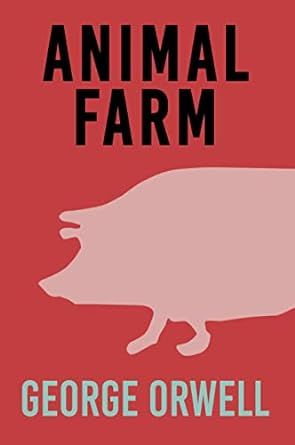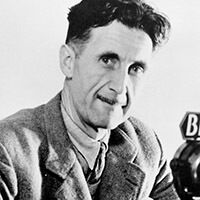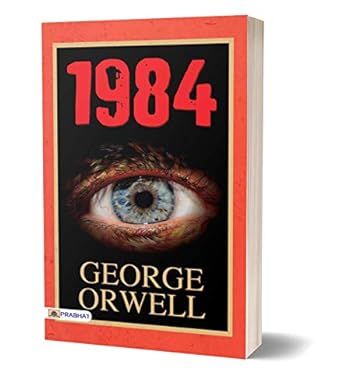
Animal Farm
4.7 out of 5
71,483 global ratings
Animal Farm is a beast fable, in the form of a satirical allegorical novella, by George Orwell, first published in England on 17 August 1945. It tells the story of a group of farm animals who rebel against their human farmer, hoping to create a society where the animals can be equal, free, and happy. Ultimately, the rebellion is betrayed, and under the dictatorship of a pig named Napoleon, the farm ends up in a state as bad as it was before.
According to Orwell, Animal Farm reflects events leading up to the Russian Revolution of 1917 and then on into the Stalinist era of the Soviet Union. Orwell, a democratic socialist, was a critic of Joseph Stalin and hostile to Moscow-directed Stalinism, an attitude that was critically shaped by his experiences during the Barcelona May Days conflicts between the POUM and Stalinist forces during the Spanish Civil War. [a] In a letter to Yvonne Davet, Orwell described Animal Farm as a satirical tale against Stalin ("un conte satirique contre Staline"), and in his essay "Why I Write" (1946), wrote that Animal Farm was the first book in which he tried, with full consciousness of what he was doing, "to fuse political purpose and artistic purpose into one whole".
About the authors
George Orwell
George Orwell is one of England's most famous writers and social commentators. Among his works are the classic political satire Animal Farm and the dystopian nightmare vision Nineteen Eighty-Four. Orwell was also a prolific essayist, and it is for these works that he was perhaps best known during his lifetime. They include Why I Write and Politics and the English Language. His writing is at once insightful, poignant and entertaining, and continues to be read widely all over the world.
Eric Arthur Blair (George Orwell) was born in 1903 in India, where his father worked for the Civil Service. The family moved to England in 1907 and in 1917 Orwell entered Eton, where he contributed regularly to the various college magazines. From 1922 to 1927 he served with the Indian Imperial Police in Burma, an experience that inspired his first novel, Burmese Days (1934). Several years of poverty followed. He lived in Paris for two years before returning to England, where he worked successively as a private tutor, schoolteacher and bookshop assistant, and contributed reviews and articles to a number of periodicals. Down and Out in Paris and London was published in 1933. In 1936 he was commissioned by Victor Gollancz to visit areas of mass unemployment in Lancashire and Yorkshire, and The Road to Wigan Pier (1937) is a powerful description of the poverty he saw there.
At the end of 1936 Orwell went to Spain to fight for the Republicans and was wounded. Homage to Catalonia is his account of the civil war. He was admitted to a sanatorium in 1938 and from then on was never fully fit. He spent six months in Morocco and there wrote Coming Up for Air. During the Second World War he served in the Home Guard and worked for the BBC Eastern Service from 1941 to 1943. As literary editor of the Tribune he contributed a regular page of political and literary commentary, and he also wrote for the Observer and later for the Manchester Evening News. His unique political allegory, Animal Farm was published in 1945, and it was this novel, together with Nineteen Eighty-Four (1949), which brought him world-wide fame.
It was around this time that Orwell's unique political allegory Animal Farm (1945) was published. The novel is recognised as a classic of modern political satire and is simultaneously an engaging story and convincing allegory. It was this novel, together with Nineteen Eighty-Four (1949), which finally brought him world-wide fame. Nineteen Eighty-Four's ominous depiction of a repressive, totalitarian regime shocked contemporary readers, but ensures that the book remains perhaps the preeminent dystopian novel of modern literature.
Orwell's fiercely moral writing has consistently struck a chord with each passing generation. The intense honesty and insight of his essays and non-fiction made Orwell one of the foremost social commentators of his age. Added to this, his ability to construct elaborately imaginative fictional worlds, which he imbued with this acute sense of morality, has undoubtedly assured his contemporary and future relevance.
George Orwell died in London in January 1950.
Read more
Reviews
Cori
5
Beautiful Book. Great for Collectors
Reviewed in the United States on May 23, 2024
Verified Purchase
I bought this book for my daughter. I read it when I was younger. It’s a great read. But this book is beautiful hard cover, with gold color lined pages. I knew the size when I bought, and I like the size. My daughter read it in a day. And no the print is not too small. I am 38 and can read the print just fine. Very pleased.
Ivet
5
loved it
Reviewed in the United States on May 29, 2024
Verified Purchase
Master piece with a lesson that never gets old. I got angry so many times with the events happening, but at the same time remembered the importance of education and never forgetting.
simone tessari
5
absolutely an extraordinary Book
Reviewed in the United States on May 28, 2024
Verified Purchase
This book gives an extraordinary human view of human nature. It light like a flash light what human in there desire for power and wealth will do to other human. How not all humans are equal. And how to identify the Pigs and the Dogs not only in society but in family’s too .This book needs to be read and reread several times over. Needs to be print in our heart as humans . Absolutely extraordinary. I will read it again and again it has open my eyes!
Read more
Kindle Customer
5
Classic needs to be read by all.
Reviewed in the United States on June 4, 2024
Verified Purchase
Read this in H.S. Loved it . This book needs to be reread by everyone. Applies to everyone regarding today's political climate.
krebsman
4
The Road to Hell is Paved with Good Intentions; Power Corrupts
Reviewed in the United States on May 6, 2024
Verified Purchase
Thanks to finishing ANIMAL FARM, I have now read all of Orwell’s fiction. Of course, 1984 is my favorite, and by far the most profound. But I really like KEEP THE ASPIDISTRA FLYING (which was the most moving) and A CLERGYMAN’S DAUGHTER, both of which show the influence of Somerset Maugham. COMING UP FOR AIR I found a piece of bittersweet nostalgia. BURMESE DAYS was just bitter. So where does ANIMAL FARM fit in? It was Orwell’s last work of fiction and I would call it a heavy-handed allegory. This does not mean that I was not entertained by it. But I was always aware that he was preaching. In this case, he was preaching to the choir. I agree with him all down the line. Of course I see the parallels to our current society; that’s pretty transparent.
I also think this book has been more influential on modern literature than is generally acknowledged. There are many striking parallels to William Golding’s LORD OF THE FLIES. I don’t think it’s coincidental that Golding’s “Piggy” is a close cousin to Orwell’s “Snowball.”
This perhaps is an exaggeration, but it seems to me that by the 21st Century, (as a companion piece to 1984) this book had become one of the key texts of a Western education. It is constantly referenced. It’s a must-read. It’s also very brief
Read more
2 people found this helpful
Top George Orwell titles
Best Sellers

The Great Alone: A Novel
4.6
-
152,447
$5.49

The Four Winds
4.6
-
156,242
$9.99

Winter Garden
4.6
-
72,838
$7.37

The Nightingale: A Novel
4.7
-
309,637
$8.61

Steve Jobs
4.7
-
24,596
$1.78

Iron Flame (The Empyrean, 2)
4.6
-
164,732
$14.99

A Court of Thorns and Roses Paperback Box Set (5 books) (A Court of Thorns and Roses, 9)
4.8
-
26,559
$37.99

Pretty Girls: A Novel
4.3
-
88,539
$3.67

The Bad Weather Friend
4.1
-
34,750
$12.78

Pucking Around: A Why Choose Hockey Romance (Jacksonville Rays Hockey)
4.3
-
41,599
$14.84

Start with Why: How Great Leaders Inspire Everyone to Take Action
4.6
-
37,152
$9.99

Tomorrow, and Tomorrow, and Tomorrow: A novel
4.4
-
95,875
$13.99

